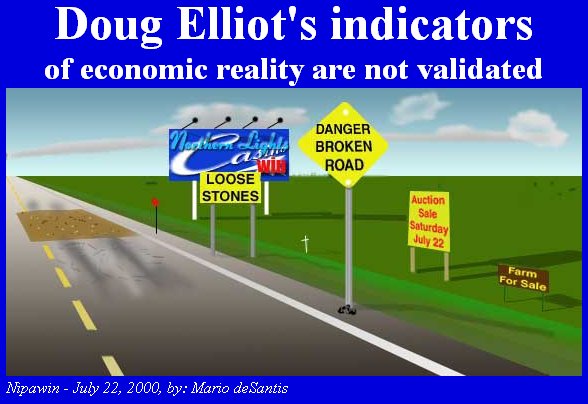Learning Stories
by
Mario deSantis
mariodesantis@hotmail.com
“I am a Canadian, free to speak without fear, free to worship in my own way, free to stand for what I think right, free to oppose what I believe wrong, and free to choose those who shall govern my country.” - -The Rt. Hon. John Diefenbaker, Canadian Bill of Rights, 1960
“The whole judicial system is at issue, it's worth more than one person.”--Serge Kujawa, Saskatchewan Crown Prosecutor, 1991
“The system is not more worth than one person's rights.”--Mario deSantis, 2002
Ensign Stories © Mario deSantis and Ensign
|
|
We have been advocating for some time radical changes in our way of thinking, so that knowledge, creativity and innovation would become the most important ingredients of our socio-economic system. We have a lot of work to do in this regard, and I will never stop to point out the current misconception about reality by some of our top statisticians. After exposing the fraudulent research on no-fault insurance by Dr. David Cassidy, we have today another statistician, Doug Elliot, who rather than listening to the stories of people, deciphers both statistical numbers and the public mood for his living, and for our misfortune. Elliot says that he uses "the most up-to-date statistics from the 15 most relevant indicators" to assess the province's performance. Most of these up-to-date statistics refer to how these economic indicators have been changing in the last year, and Elliot states that "13 of them seem to indicate that things in Saskatchewan are pretty good right now." However, Elliot adds that we have here in Saskatchewan a "permanent gloom-and-doom mentality... even when 87 per cent of the economic indicators are favourable." Further, Elliot laments that the public is not focusing on the positives especially now when the government is on course for the largest tax cut in the province's history. What Elliot is saying is that reality is not reflected in the mood of people. In our supposed knowledge economy Elliot's economic indicators fail to include the most important long term sociological statistics, that is education of our population and demographic shifts. Also, Elliot's complain that we are not focusing on the positives reminds me of Dr. Cassidy's fallacy that no-fault insurance is a better system since injured people focus on getting healthier rather than on suing for damages. And as the largest tax cut is concerned, I have no trust that this overall tax cut will ever occur as long as the present economic direction for the few and privileged is maintained. The reality portrayed by Elliot's economic indicators are not validated in the realities of our people, and people's realities are more relevant than the reality portrayed by statistical numbers. References Reality not reflected in mood, by Murray Mandryk, July 21, 2000, The Leader-Post, Regina, Saskatchewan Dr. Cassidy's study on no-fault insurance: supporting another shock absorber, by Mario deSantis, April 21, 2000 Articles by Mario deSantis published by Ensign Editor's note: Doug Elliot publishes his newsletter regularly and it is frequently quoted by government and other agencies siting the findings of Saskatchewan Trends Monitor. However, the actual documents themselves appear not to be available online as it is likely that the newsletter is a commercial product sold by subscription. In your efforts with a search engine you will find a large number of references but all just comments upon the actual material. Information is power.
|
